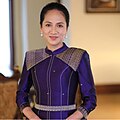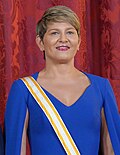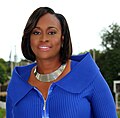| State | Head of government | Spouse | Image |
|---|
 Afghanistan Afghanistan | Acting Prime Minister Hasan Akhund | — | |
 Albania Albania | Prime Minister Edi Rama | Linda Rama | |
 Algeria Algeria | Prime Minister Aymen Benabderrahmane | — | |
 Andorra Andorra | Head of Government Xavier Espot Zamora | — | |
 Angola Angola | President João Lourenço | Ana Dias Lourenço |  |
 Antigua and Barbuda Antigua and Barbuda | Prime Minister Gaston Browne | Maria Bird-Browne |  |
 Argentina Argentina | President Javier Milei | Yuyito González (domestic partner) | |
 Armenia Armenia | Prime Minister Nikol Pashinyan | Anna Hakobyan |  |
 Australia Australia | Prime Minister Anthony Albanese | Jodie Haydon |  |
 Austria Austria | Federal Chancellor Christian Stocker | Gerda Legenstein | |
 Azerbaijan Azerbaijan | Prime Minister Ali Asadov | Zamira Asadova | |
 Bahamas Bahamas | Prime Minister Philip Davis | Anne-Marie Davis | |
 Bahrain Bahrain | Prime Minister Crown Prince Salman bin Hamad Al Khalifa | Divorced
Formerly, Shaikha Hala bint D'aij Al Khalifa (div. 2005) | |
 Bangladesh Bangladesh | Prime Minister Muhammad Yunus | Afrozi Yunus | |
 Barbados Barbados | Prime Minister Mia Mottley | — | |
 Belarus Belarus | Prime Minister Alexander Turchin | Inna [1] | |
 Belgium Belgium | Prime Minister Bart De Wever | Veerle Hegge | |
 Belize Belize | Prime Minister Johnny Briceño | Rossana Maria Briceño |  |
 Benin Benin | President Patrice Talon | Claudine Talon |  |
 Bhutan Bhutan | Prime Minister Tshering Tobgay | Tashi Dolma | |
 Bolivia Bolivia | President Rodrigo Paz | Maria Elena Urquidi | |
 Bosnia and Herzegovina Bosnia and Herzegovina | Chairman of the Council of Ministers Borjana Krišto | Branko Krišto | |
 Botswana Botswana | President Duma Boko | Kaone Boko | |
 Brazil Brazil | President Luiz Inácio Lula da Silva | Rosângela Lula da Silva |  |
 Brunei Brunei | Prime Minister Sultan Hassanal Bolkiah | Queen Saleha |  |
 Bulgaria Bulgaria | Prime Minister Kiril Petkov | Linda McKenzie | |
 Burkina Faso Burkina Faso | Prime Minister Apollinaire Joachim Kyélem de Tambèla | ? | |
 Burundi Burundi | Prime Minister Gervais Ndirakobuca | — | |
 Cambodia Cambodia | Prime Minister Hun Manet | Pich Chanmony |  |
 Cameroon Cameroon | Prime Minister Joseph Ngute | — | |
 Canada Canada | Prime Minister Mark Carney | Diana Fox Carney |  |
 Cape Verde Cape Verde | Prime Minister Ulisses Correia e Silva | — | |
 Central African Republic Central African Republic | Prime Minister Félix Moloua | — | |
 Chad Chad | Acting Prime Minister Saleh Kebzabo | Jeanne Kebzabo |  |
 Chile Chile | President Gabriel Boric | Paula Carrasco (domestic partner) |  |
 China China | Premier of the State Council Li Qiang | Lin Huan | |
 Colombia Colombia | President Gustavo Petro | Verónica Alcocer |  |
 Comoros Comoros | President Azali Assoumani | Ambari Daroueche | |
 Congo, Democratic Republic of the Congo, Democratic Republic of the | Prime Minister Jean-Michel Sama Lukonde | — | |
 Congo, Republic of the Congo, Republic of the | Prime Minister Anatole Collinet Makosso | — | |
 Costa Rica Costa Rica | President Rodrigo Chaves Robles | Signe Zeicate |  |
 Croatia Croatia | Prime Minister Andrej Plenković | Ana Maslać Plenković | |
 Cuba Cuba | President of the Council of Ministers Manuel Marrero Cruz | — | |
 Cyprus Cyprus | President Nikos Christodoulides | Philippa Karsera | |
 Czech Republic Czech Republic | Prime Minister Petr Fiala | Jana Fialová | |
 Denmark Denmark | Prime Minister Mette Frederiksen | Bo Tengberg | |
 Djibouti Djibouti | Prime Minister Abdoulkader Kamil Mohamed | — | |
 Dominica Dominica | Prime Minister Roosevelt Skerrit | Melissa Poponne Skerrit | |
 Dominican Republic Dominican Republic | President Luis Abinader | Raquel Arbaje |  |
 Ecuador Ecuador | President Daniel Noboa | Lavinia Valbonesi |  |
 Egypt Egypt | Prime Minister Mostafa Madbouly | — | |
 El Salvador El Salvador | President Nayib Bukele | Gabriela Rodríguez de Bukele |  |
 Equatorial Guinea Equatorial Guinea | Prime Minister Manuela Roka Botey | — | |
 Eritrea Eritrea | President Isaias Afwerki | Saba Haile | |
 Estonia Estonia | Prime Minister Kaja Kallas | Arvo Hallik | |
 Eswatini Eswatini | Prime Minister Russell Dlamini | Philile Dlamini | |
 Ethiopia Ethiopia | Prime Minister Abiy Ahmed | Zinash Tayachew |  |
 Fiji Fiji | Prime Minister Sitiveni Rabuka | Suluweti Tuiloma | |
 Finland Finland | Prime Minister Petteri Orpo | Niina Kanniainen-Orpo | |
 France France | Prime Minister Sébastien Lecornu | — | |
 Gabon Gabon | Prime Minister Alain Claude Bilie By Nze | — | |
 Gambia, The Gambia, The | President Adama Barrow | Fatoumatta Bah | |
| Sarjo Mballow | |
 Georgia Georgia | Prime Minister Irakli Kobakhidze | Natalia Motsonelidze | |
 Germany Germany | Federal Chancellor Friedrich Merz | Charlotte Gass |  |
 Ghana Ghana | President John Mahama | Lordina Mahama |  |
 Greece Greece | Prime Minister Kyriakos Mitsotakis | Mareva Grabowski-Mitsotakis |  |
 Grenada Grenada | Prime Minister Keith Mitchell | Marietta Mitchell | |
 Guatemala Guatemala | President Alejandro Giammattei | Divorced
Formerly Rosana Cáceres (div. ?) | |
 Guinea Guinea | Acting Prime Minister Mohamed Béavogui | — | |
 Guinea-Bissau Guinea-Bissau | Prime Minister Nuno Gomes Nabiam | — | |
 Guyana Guyana | Prime Minister Mark Phillips | Mignon Bowen-Phillips | |
 Haiti Haiti | Prime Minister Ariel Henry | Annie Claude Massiau | |
 Honduras Honduras | President Xiomara Castro | Manuel Zelaya |  |
 Hungary Hungary | Prime Minister Viktor Orbán | Anikó Lévai | |
 Iceland Iceland | Prime Minister Katrín Jakobsdóttir | Gunnar Örn Sigvaldason | |
 India India | Prime Minister Narendra Modi | Estranged
Jashodaben Modi (sep. 1971) |  |
 Indonesia Indonesia | President Prabowo Subianto | Separated
Titiek Suharto (sep. 1998) | |
 Iran Iran | President Masoud Pezeshkian | Fatemeh Majidi | |
 Iraq Iraq | Prime Minister Muhammad Shayya al-Sudani | ? | |
 Ireland Ireland | Taoiseach Micheál Martin | Mary Martin | |
 Israel Israel | Prime Minister Benjamin Netanyahu | Sara Netanyahu |  |
 Italy Italy | President of the Council of Ministers Giorgia Meloni | — | |
 Ivory Coast Ivory Coast | Prime Minister Patrick Achi | — | |
 Jamaica Jamaica | Prime Minister Andrew Holness | Juliet Holness |  |
 Japan Japan | Prime Minister Sanae Takaichi | Taku Yamamoto |  |
 Jordan Jordan | Prime Minister Bisher Al-Khasawneh | Rana Sultan | |
 Kazakhstan Kazakhstan | Prime Minister Askar Mamin | Altynai Mamina | |
 Kenya Kenya | President Uhuru Kenyatta | Margaret Kenyatta |  |
 Kiribati Kiribati | President Taneti Maamau | Teiraeng Tentoa Maamau | |
 Kuwait Kuwait | Prime Minister Sheikh Sabah Al-Khalid Al-Sabah | Sheikha Aida Salim Al Ali Al Sabah | |
 Kyrgyzstan Kyrgyzstan | Chairman of the Cabinet of Ministers Akylbek Japarov | ? | |
 Laos Laos | Prime Minister Sonexay Siphandone | Vandala Siphandone |  |
 Latvia Latvia | Prime Minister Arturs Krišjānis Kariņš | Anda Kariņa | |
 Lebanon Lebanon | President of the Council of Ministers Nawaf Salam | Sahar Baassiri | |
 Lesotho Lesotho | Prime Minister Moeketsi Majoro | 'Masekoalane Majoro | |
 Liberia Liberia | President Joseph Boakai | Kartumu Yarta Boakai [2] | |
 Libya Libya | Prime Minister Abdul Hamid Dbeibeh | Amina el-Shawush | |
 Liechtenstein Liechtenstein | Head of Government Brigitte Haas | Hubert Ospelt | |
 Lithuania Lithuania | Prime Minister Inga Ruginienė | Vismantas Ruginis | |
 Luxembourg Luxembourg | Prime Minister Luc Frieden | Marjolijne Droogleever Fortuyn | |
 Madagascar Madagascar | Prime Minister Herintsalama Rajaonarivelo | — | |
 Malawi Malawi | President Peter Mutharika | Gertrude Maseko | |
 Malaysia Malaysia | Prime Minister Anwar Ibrahim | Wan Azizah Wan Ismail |  |
 Maldives Maldives | President Mohamed Muizzu | Sajidha Mohamed |  |
 Mali Mali | Acting Prime Minister Choguel Kokalla Maïga | — | |
 Malta Malta | Prime Minister Robert Abela | Lydia Abela Zerafa | |
 Marshall Islands Marshall Islands | President Hilda Heine | Thomas Kijiner Jr | |
 Mauritania Mauritania | Prime Minister Mokhtar Ould Djay | — | |
 Mauritius Mauritius | Prime Minister Navin Ramgoolam | Veena Ramgoolam | |
 Mexico Mexico | President Claudia Sheinbaum Pardo | Jesús María Tarriba |  |
 Micronesia, Federated States of Micronesia, Federated States of | President Wesley Simina | Ancelly | |
 Moldova Moldova | Prime Minister Alexandru Munteanu | — | |
 Monaco Monaco | Minister of State Christophe Mirmand | — | |
 Mongolia Mongolia | Prime Minister Gombojavyn Zandanshatar | — | |
 Montenegro Montenegro | Prime Minister Milojko Spajić | Milena Spajić | |
 Morocco Morocco | Head of Government Aziz Akhannouch | Salwa Idrissi Akhannouch | |
 Mozambique Mozambique | Prime Minister Maria Benvinda Levy | — | |
 Myanmar Myanmar | Prime Minister Nyo Saw | San San Aye | |
 Namibia Namibia | Prime Minister Elijah Ngurare | — | 9 |
 Nauru Nauru | President David Adeang | — | |
 Nepal Nepal | Prime Minister Sushila Karki | Durga Prasad Subedi | |
 Netherlands Netherlands | Prime Minister Dick Schoof | Loes Meurs | |
 New Zealand New Zealand | Prime Minister Christopher Luxon | Amanda Luxon | |
 Nicaragua Nicaragua | President Daniel Ortega | Rosario Murillo |  |
 Niger Niger | Prime Minister Ali Lamine Zeine | — | |
 Nigeria Nigeria | President Bola Tinubu | Remi Tinubu | |
 North Korea North Korea | Premier of the Cabinet Kim Tok-hun | — | |
 North Macedonia North Macedonia | President of the Government Zoran Zaev | Zorica Zaeva | |
 Norway Norway | Prime Minister Jonas Gahr Støre | Marit Slagsvold | |
 Oman Oman | Prime Minister Sultan Haitham bin Tariq | Sayyida Ahad bint Abdullah | |
 Pakistan Pakistan | Prime Minister Shehbaz Sharif | Nusrat Shehbaz | |
| Tehmina Durrani |  |
 Palau Palau | President Surangel Whipps Jr. | Valerie Esang Remengesau | |
 Palestine Palestine | Prime Minister Mohammad Shtayyeh | — | |
 Panama Panama | President José Raúl Mulino | Marisel Cohen de Mulino | |
 Papua New Guinea Papua New Guinea | Prime Minister James Marape | Rachael Marape | |
 Paraguay Paraguay | President Santiago Peña | Leticia Ocampos |  |
 Peru Peru | President of the Council of Ministers Ernesto Álvarez Miranda | — | |
 Philippines Philippines | President Bongbong Marcos | Liza Araneta Marcos |  |
 Poland Poland | Chairman of the Council of Ministers Donald Tusk | Małgorzata Tusk [3] |  |
 Portugal Portugal | Prime Minister Luís Montenegro | Carla Montenegro | |
 Qatar Qatar | Prime Minister Sheikh Mohammed bin Abdulrahman bin Jassim Al Thani | — | |
 Romania Romania | Prime Minister Ilie Bolojan | — | |
 Russia Russia | Chairman of the Government Mikhail Mishustin | Vladlena Mishustina | |
 Rwanda Rwanda | Prime Minister Justin Nsengiyumva | ? | |
 Saint Kitts and Nevis Saint Kitts and Nevis | Prime Minister Terrance Drew | — | |
 Saint Lucia Saint Lucia | Prime Minister Philip J. Pierre | — | |
 Saint Vincent and the Grenadines Saint Vincent and the Grenadines | Prime Minister Godwin Friday | — | |
 Samoa Samoa | Prime Minister Laʻauli Leuatea Schmidt | — | |
 San Marino San Marino | Secretary for Foreign and Political Affairs Luca Beccari | — | |
 São Tomé and Príncipe São Tomé and Príncipe | Prime Minister Américo Ramos | — | |
 Saudi Arabia Saudi Arabia | Prime Minister King Salman | Fahda bint Falah Al Hithlain | |
 Senegal Senegal | President Bassirou Diomaye Faye | Marie Khone Faye | Absa Faye |  |  |
 Serbia Serbia | Prime Minister Đuro Macut | — | |
 Seychelles Seychelles | President Patrick Herminie | Veronique Herminie | |
 Sierra Leone Sierra Leone | Chief Minister David Moinina Sengeh | — | |
 Singapore Singapore | Prime Minister Lawrence Wong | Loo Tze Lui | |
 Slovakia Slovakia | Prime Minister Eduard Heger | Lucia Hegerová | |
 Slovenia Slovenia | Prime Minister Robert Fico | | |
 Solomon Islands Solomon Islands | Prime Minister Manasseh Sogavare | Emmy Sogavare | |
 Somalia Somalia | Prime Minister Hamza Abdi Barre | — | |
 South Africa South Africa | President Cyril Ramaphosa | Tshepo Motsepe |  |
 South Korea South Korea | President Lee Jae Myung | Kim Hea Kyung |  |
 South Sudan South Sudan | President Salva Kiir Mayardit | Mary Ayen Mayardit | |
| Aluel William Nyuon Bany | |
 Spain Spain | President of the Government Pedro Sánchez | María Begoña Gómez Fernández | |
 Sri Lanka Sri Lanka | Prime Minister Harini Amarasuriya | — | |
 Sudan Sudan | Prime Minister Kamil Idris | Azza Mohyeldeen Ahmed | |
 Suriname Suriname | President Jennifer Geerlings-Simons | Glenn Geerlings | |
 Sweden Sweden | Prime Minister Ulf Kristersson | Birgitta Ed | |
 Switzerland Switzerland | President Karin Keller-Sutter | Morten Keller | |
 Syria Syria | President Ahmed al-Sharaa | Latifa al-Droubi | |
 Tajikistan Tajikistan | Prime Minister Kokhir Rasulzoda | — | |
 Tanzania Tanzania | Prime Minister Mwigulu Nchemba | — | |
 Thailand Thailand | Prime Minister Anutin Charnvirakul | Thananont Niramit | |
 Timor-Leste Timor-Leste | Prime Minister Xanana Gusmão | — | |
 Togo Togo | Prime Minister Faure Gnassingbé | — | |
 Tonga Tonga | Prime Minister ʻAisake Eke | — | |
 Trinidad and Tobago Trinidad and Tobago | Prime Minister Kamla Persad-Bissessar | Gregory Bissessar | |
 Tunisia Tunisia | Head of Government Sara Zaafarani | — | |
 Turkey Turkey | President Recep Tayyip Erdoğan | Emine Erdoğan |  |
 Turkmenistan Turkmenistan | President Serdar Berdimuhamedow | — | |
 Tuvalu Tuvalu | Prime Minister Feleti Teo | — | |
 Uganda Uganda | Prime Minister Robinah Nabbanja | ? | |
 Ukraine Ukraine | Prime Minister Yulia Svyrydenko | Serhiy Derlemenko | |
 United Arab Emirates United Arab Emirates | Prime Minister Sheikh Mohammed bin Rashid Al Maktoum | Sheikha Hind bint Maktoum Al Maktoum | |
 United Kingdom United Kingdom | Prime Minister Keir Starmer | Victoria Starmer |  |
 United States United States | President Donald Trump | Melania Trump |  |
 Uruguay Uruguay | President Luis Lacalle Pou | Divorced
Formerly, Lorena Ponce de León (div. 2024) |  |
 Uzbekistan Uzbekistan | Prime Minister Abdulla Aripov | ? | |
 Vanuatu Vanuatu | Prime Minister Jotham Napat | Lettis Napat | |
 Vatican City Vatican City | President of the Governorate Archbishop Fernando Vérgez Alzaga | Celibate | |
 Venezuela Venezuela | President Nicolás Maduro
(disputed during the Venezuelan presidential crisis,
11 January 2019 – 5 January 2023 [b] ) | Cilia Flores |  |
 Vietnam Vietnam | Prime Minister Phạm Minh Chính | Lê Thị Bích Trân | |
 Yemen Yemen | Prime Minister Maeen Abdulmalik Saeed | — | |
 Zambia Zambia | President Hakainde Hichilema | Mutinta Hichilema |  |
 Zimbabwe Zimbabwe | President Emmerson Mnangagwa | Auxillia Mnangagwa | |












































